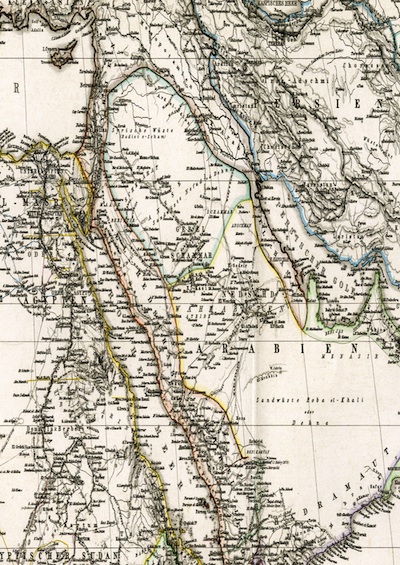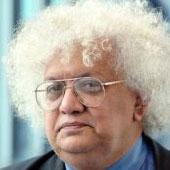The Centennial Crisis Cycle and the Middle East
How the West is implicated in the current fires burning in the Middle East.
October 13, 2014

In August 2014, we “celebrated” the centenary of the start of the First World War. Much attention was paid to the ill-fated legacy of the Versailles Treaty, which more or less led to the Second World War. The underlying “German problem” only came to an end in 1991, when all of Germany was at peace with Europe and reunited.
There was also much debate about the breakup of the Austro-Hungarian Empire after 1918, which brought many nations to life for the first time in Europe. Their fate after the Second World War still occupies us to this day, even though in 1991, the liberation of Eastern Europe brought a chapter of that unwinding to a positive resolution.
But there is still one chapter unfinished – and we are currently very much embroiled in it. This is the end of the Ottoman Empire at the end of the First World War. By 1916, France and Great Britain had signed the secret Sykes Picot Treaty partitioning the Ottoman Empire.
The Ottoman Emperor was also the Caliph. Kemal Pasha, who took over Turkey, the heart of that Empire, was an atheist and abolished the Caliphate. For the first time in 1,200 years, Sunni Islam was without a Caliph. It was as if someone had abolished the Papacy.
The problems of today were born in the past
The upheaval we face in the Middle East today, properly understood, is not about ISIS. It is the last unresolved problem of the First World War.
To be sure, the Islamic State or ISIS or ISIL, the “Caliphate,” however one calls it, harkens back to that deep wound in Sunni Islam’s psyche.
The state boundaries drawn by the Sykes Picot Treaty were somewhat imaginary — though the territories known as Iraq or Syria have been known even before they became provinces of the Empire.
The people chosen to be the kings of these “countries” were of equally dubious merit, as the memoirs of Lawrence of Arabia tell us.
Lest we forget, the Kurds were left unhappy at having been partitioned between three newly designated countries –Turkey, Iraq and Syria.
In the case of Syria, Iraq and Egypt, these kings were succeeded by secular governments. The dream then became a united Arab entity under one leader.
It was the advent of Israel in 1948 — itself a result of the Balfour Declaration during WWI and the Arab rejection of it — which set off the first cycle of wars in the Middle East.
After three defeats (in 1948, 1967 and 1973), the secular pan-Arab parties were in disgrace. The people of the region realized that the answer to their problems was not to be found in socialism or Ba’athism.
Religion beckoned as the fall-back answer. As if to add oil to the proverbial fire, the oil shock of 1973/4 greatly enriched the Saudis and they used those funds to propagate their radical brand of Islam as the only path.
The 40 years since 1973 have been unsettling for the region. The revival of Shia Islam in Iran and the overthrow of the monarchy in 1979 led to a ten-year war between Iraq and Iran. This was soon followed by the takeover of Kuwait by Iraq and the 1991 war sanctioned by the UN.
That did nothing to settle the underlying issues going back to WWI. Particularly crucial in this historic context is that fact that the U.S. and UK armies failed to make any post-war settlement which would have addressed the issue of making a nation out of Iraq.
The Shia majority took their revenge for decades of oppression — and answered in kind under Nouri Al-Maliki’s government.
Russia’s incursion into Afghanistan, presumed to be a late footnote to the Cold War, was the first time we in the West became aware of the mess which was – and is — the Middle East.
It was also a sign, though we did not see it that way, of a deep crisis in Sunni Islam. Islamism is a movement against governments in Muslim-majority countries more than it is against the West. Its advocates want sharia-compliant governments everywhere there is a Muslim state.
From Pakistan at one end to Algeria at the other and now extending southward to Nigeria and Sudan, Islamist forces are undermining Muslim populations and their governments.
History reveals the follies of the West
Once we part with our own cultural chauvinism (in the form of a Eurocentric view of modern history) and look at a centennial arc in a wider context, we realize that we are now stuck with the Ottoman Empire and its decline.
But this is no time for any finger-pointing or cultural disdain. Any sound analysis – even as simple and undeniable as looking at cause and effect — points to the West’s key role in this.
The boundaries between Syria and Iraq are still fluid because key powers did not solve the issue. Syria has faced a revolt against Assad, which he has successfully stalled at a great cost in human lives. Refugees have flooded into Turkey, Jordan and Lebanon.
Now, in ISIS, we do not only face an extreme version of Islamism – but also a direct echo of prolonged Western negligence, if not irresponsibility. Hard though it may be to imagine for Western minds “trained” on the peril and radicalism of Al Qaeda, ISIS rejects that force as not pure enough.
It is as painful as it is logical that ISIS has parked itself in the large territory between Iraq and Syria since the boundaries have been artificial anyway. By reviving the Caliphate, it has addressed the deep wound in the Sunni psyche.
The West is responding — but only hesitantly so (and, once again, more from its own selfish, short termist perspective than the crisis demands).
There is a lot of latent and even open dislike of Muslims in the West. It would be cynical to say “let them kill each other.”
But that would be neither wise nor prudent. We have a humanitarian crisis which requires a military response as much as relief operations.
This may be the final unsolved problem of the First World War — but maybe we can solve it within a century of 1918. Then, the pernicious cycle of collective irresponsibility that unloaded itself in the famed guns of August (1914) would finally have come to a long-overdue close.
What can be done?
There evidently is no immediate solution to the Middle East conundrum. What can be done? One option is try the idea of a comprehensive international conference that would take on all the interrelated problems of Syria, Iraq, Iran, Lebanon and Jordan. And it would take in Israel?Palestine issues as well.
It may not work, but if there is even a 10% chance that it may resolve some disputes, it is worth trying.
Either way, we need to come to terms with the fact that the ‘nations’ carved out after 1918 were artificial entities. In addition, there remain “nations without states.” The Kurds want a nation-state, but at present their people are spread across three “nations” of the Middle East as we have come to know it. ISIS has shown how flimsy these borders are.
The Versailles conference was not a smashing success by any means, but at least it took place. In contrast, there was never a conference to discuss the Ottoman Empire’s aftermath conclusively.
Takeaways
The upheaval we face in the Middle East today, properly understood, is not about ISIS.
The Islamic State's origins harken back to lines drawn by the West, leaving a deep wound in Sunni Islam’s psyche.
In ISIS, we do not only face an extreme version of Islamism – but a direct echo of prolonged Western negligence.
Russia’s incursion into Afghanistan was the first time the West became aware of the mess which was – and is — the Middle East.
Islamism is a movement against governments in Muslim-majority countries more than it is against the West.
From Pakistan at one end to Algeria at the other, Islamist forces are undermining Muslim populations.

